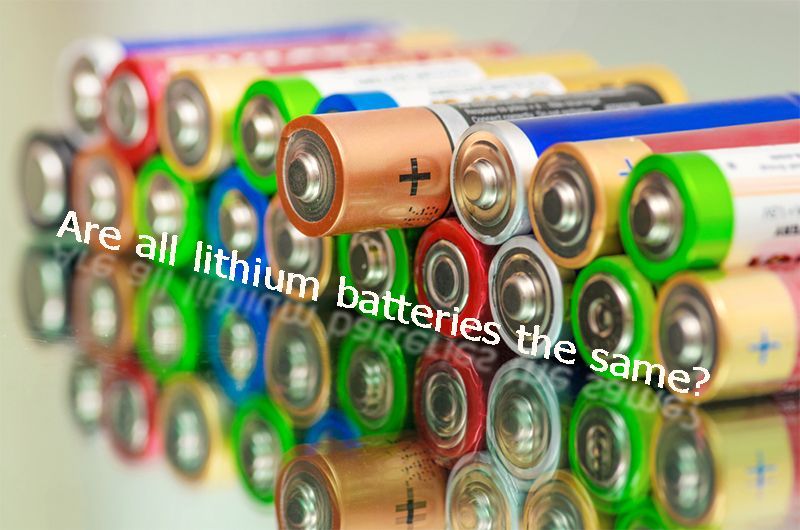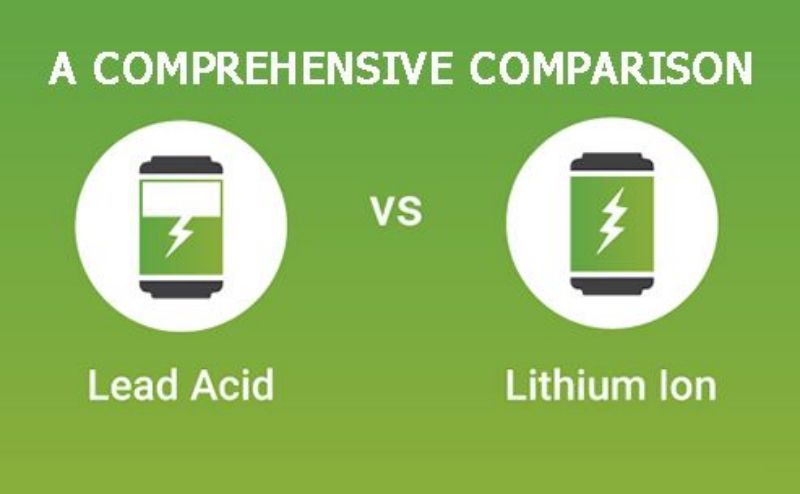
Main content:
- 1.Is a lithium battery better than a regular battery?
- 2.What batteries are better than lithium?
- 3.Differences between a lithium battery vs other batteries
- ① Voltage
- ② Capacity
- ③ Energy density
- ④ C-rate
- ⑤ Cycle life
- ⑥ Storage temperature
- ⑦ Cost
- ⑧ Applications
- 4.Which is the best battery lithium or lead acid?
- 5.Are lithium batteries more powerful than alkaline?
- 6.Are Lithium Batteries Worth The Extra Cost?
- 7.When should you use a lithium battery?
- ① Emergency power backup or UPS
- ② Electric and recreational vehicles
- ③ Solar power storage
- ④ Surveillance or alarm systems in remote locations
- ⑤ Portable power packs
- 8.Are all lithium batteries the same?
A lithium battery, is advanced battery technology. It uses lithium ions as a key component of its work. It is a rechargeable battery and is made up of four components. These include electrolyte, anode, cathode, and separator. During charging and discharging, lithium ions are embedded and de-embedded back and forth between the two electrodes. When charging lithium battery, lithium ions are removed from the anode and embedded into the cathode through the electrolyte, which is in a lithium-rich state, while the opposite is true when discharging.
1.Is a lithium battery better than a regular battery?
A regular battery, such as conventional lead-acid battery, alkaline battery and nickel-metal hydride battery. Regular batteries have serious environmental pollution, many batteries contain mercury, lead and other heavy metals, serious pollution to the environment, but lithium batteries do not contain harmful metals. In addition, lithium-ion batteries also have a long cycle life of up to 4,000 cycles, which regular batteries beyond reach, and many lithium-ion batteries now have protective circuits in their structure. Therefore, a lithium battery vs other batteries, it is much better than any other regular battery.
① Last much longer
Lithium batteries are modern and advanced, their life lasts much longer than regular batteries. This is why they are suitable for high technology and smart devices and those devices in which replacing batteries is inconvenient or even impossible.
② Withstand low temperatures
The operating temperature of lithium batteries is -20-60℃, even below 0℃. In addition, lithium batteries can be customized according to the requirements of application scenarios, and heat preservation designs such as heating plates can be added, making them ideal for outdoor applications as they can operate without failing even in cold temperatures.
③ Lighter in weight
Furthermore, lithium battery vs other batteries, it has a high energy density, it's also much lighter in weight than regular batteries. Therefore, it does't make the devices heavier when installed. This characteristic allows it to be preferred over regular batteries for use in portable devices, especially in cordless power tools.
2.What batteries are better than lithium?
When lithium battery vs other batteries, it is a no-brainer that lithium batteries are better than regular batteries. However, while lithium battery vs other batteries, we see that many new, modern and advanced batteries have either been developed or are in the process of development. Still, these batteries have proven to be no better than lithium batteries.
① Sodium battery
Sodium-ion batteries are a kind of new battery. Sodium is one of the most abundant minerals found on earth and can be easily extracted from seawater, Sodium salt raw materials are abundant and cheap. However, the large ionic radius of sodium ions leads to great resistance of embedding/de-embedding in the anode and cathode, and the capacity of sodium ions in the positive poles is very small. In addition, sodium ion batteries have poor reversibility and large irreversible capacity loss, so much so that sodium-ion batteries are nowhere near as good as lithium-ion batteries.
② Fluoride battery
Fluoride batteries are more robust and, therefore, last more. However, using fluoride to make the battery is quite difficult on its own. For this to work, a liquid electrolyte needs to be used to stabilize the fluorine and make it usable at room temperature.
③ Magnesium battery
Due to recent development, magnesium batteries with high levels of energy, power, and stability are made that are unmatched by the magnesium batteries of the past. The development of magnesium batteries with potentially excellent performance has been slow due to two obstacles. First, during the initial charging process, dense passivation film is formed on the surface of the anode material, which makes it difficult for magnesium ions to pass through and limits the electrochemical activity of magnesium. Second, compared with Li+, Mg2+ has high charge and strong polarization, and tends to exist in the form of solvation, so Mg2+ is more difficult to embed into general matrix materials than Li+.
④ Zinc Ion battery
Zinc ion batteries have gained quite a popularity in the market as well. A rechargeable, water-based zinc battery developed by U.S. researchers is expected to rival the lithium-ion batteries currently in widespread use, but it has yet to be commercialized in practical applications.
3.Differences between a lithium battery vs other batteries
There are many other types of batteries apart from lithium batteries, such as lead-acid batteries, alkaline batteries, nickel-metal hydride batteries, nickel-cadmium batteries, etc. Each has its own unique features and differences compared to a lithium battery. Next, we will elaborate differences between lithium battery vs other batteries.
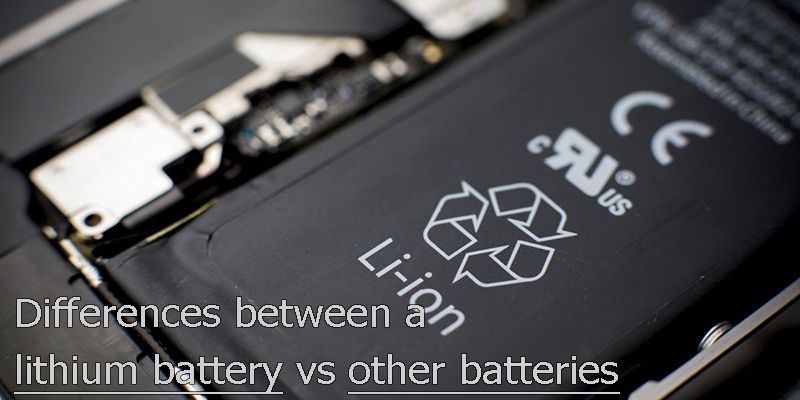
① Voltage
Not all lithium batteries have the same voltage. The ternary lithium battery have a nominal voltage of 3.7v per cell while lithium iron phosphate is 3.2v. It is higher than lead-acid batteries with a voltage of approximately 2 volts per cell,alkaline batteries having a voltage of 1.5 volts per cell, Nickel-metal hydride and Nickel-cadmium batteries having a voltage of 1.2 volts per cell.
② Capacity
For an 18650 rechargeable battery with a capacity of 2200mAh, discharging from 1C to 3.7V takes an hour, and its battery capacity (C) =2200mA x 1 hour =2200mAh, and the battery energy is 2200mAh x 3.7V = 8140Wh. On the other hand, lead-acid batteries require three times less energy per kWh to produce. When it comes to alkaline batteries, they have a capacity of 0.0039 kWh. Nickel-metal hydride batteries have a capacity of about 1.1–2.8 Ampere hours, while Nickel-cadmium batteries have it off around 5 Ampere hours.
③ Energy density
It has the highest energy density when lithium battery vs other batteries. It range from 120-265 Wh/kg. Lead-acid batteries have an energy density of 30-50 Wh/kg, alkaline batteries of 100-150 Wh/kg, Nickel-metal hydride batteries of 60-100 Wh/kg, and Nickel-cadmium batteries of about 45-70 Wh/kg.
④ C-rate
A C-rate is the charge and discharge rate, generally used to indicate the size of the charge and discharge current.Lithium batteries have a C-rate range of 0.2-3C, lead-acid of 0.2-0.05C (5-20 hours), Nickel-metal hydride of 0.2C (5 hours), and Nickel-cadmium batteries are normally of C/10 (1 Ampere per hour).
⑤ Cycle life
One cycle life is a period of use from fully charged to fully discharged and fully recharged again. The cycle life of Lithium batteries is up to 4,000 cycles, lead-acid batteries is 1500, Nickel-metal hydride is 700-1000, and Nickel-cadmium batteries is about 200-1500 cycles. Alkaline batteries do not have a particular cycle life but have 5-10 years shelf life. These values show that it has the longest cycle life when lithium battery vs other batteries.
⑥ Storage temperature
The storage temperature for lithium batteries ranges from -20 to 60°C, for lead-acid, it is -40-60℃, for alkaline, it is 10-35℃, for Nickel-metal hydride it is from -20 to 60°C and for Nickel-cadmium batteries it is -40 to 60°C.
⑦ Cost
The cost of lithium batteries is about $100, for lead-acid, it is $40, for alkaline it is $112, and for Nickel-metal hydride and Nickel-cadmium batteries, costs range from $50-$60.However, the average daily cost of lithium battery is much lower than that of other batteries due to its long cycle life, slow attenuation, and continuous stability.
⑧ Applications
Lithium batteries may be used in UPS, electrical and recreational vehicle powers, electrical vehicle, reliable and light-weight marine performances, solar power storage, surveillance, and alarm systems. Lead-acid batteries are used in small-scale UPS systems, starting lighting and ignition of automobiles, and even in large, grid-scale power systems. Alkaline batteries are used in low–drain applications like flashlights, portable radios, alarm clocks, remote controls, toys, etc. Nickel-metal hydride batteries also have different uses. They are installed in hybrid automobile batteries, electric shavers and razors, toothbrushes, camcorders, pagers, and medical instruments/equipment. Lastly, nickel-cadmium batteries are used in cordless and wireless telephones, emergency lighting, and other applications. With a relatively low internal resistance, these batteries can supply high surge currents.
4.Which is the best battery lithium or lead acid?
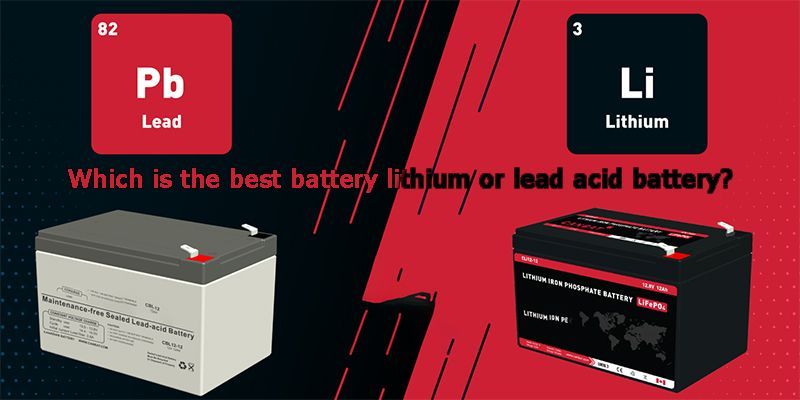
Lead-acid batteries are cost-effective in the short term. They are best used in abundant space, and energy requirements are low. However, lithium batteries With much higher cycle life, they are better in the long term. When looking at prices in terms of power and range, lithium batteries should be preferred. Lithium batteries also allow for more space for important payloads as well as their high-energy density also allows for a much larger range. Moreover, charging a lead-acid battery can take up to 10 hours, while lithium batteries charge in about 3 hours; In addition, because lithium batteries have a longer cycle life than lead-acid batteries, their average daily cost is lower than lead-acid batteries. therefore, lithium batteries save you money overall and are much better than lead-acid batteries.
5.Are lithium batteries more powerful than alkaline?
Lithium batteries can give off a strong energy supply after a long period of low discharge. On the other hand, alkaline batteries provide appropriate, long-term power, but lose strength and energy over time. Therefore, in many aspects, lithium batteries prove to be more powerful than alkaline batteries.
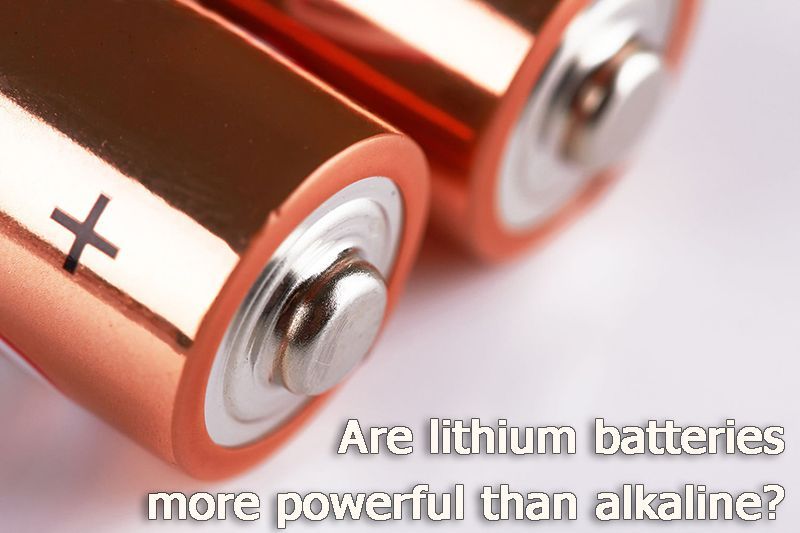
6.Are Lithium Batteries Worth The Extra Cost?
Lithium batteries seem to more expensive than other available options as lithium battery vs other batteries. However, these batteries have many advantages which make their price worth it. And in the long run, it's cheaper to use lithium battery vs other batteries because of its longer cycle life and better performance. Using these batteries in critical devices surely justifies your spending so much money on them. On the contrary, spending an extra amount on lithium batteries for devices that do not need such high-end technology as toys would surely be a waste of money.
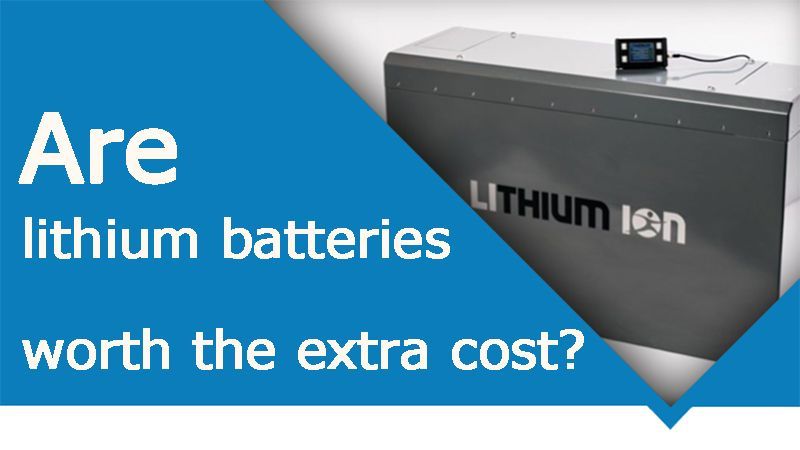
7.When should you use a lithium battery?
When lithium battery vs other batteries, it's a high-technology battery. You should use it for critically important things.
① Emergency power backup or UPS
Using lithium batteries for such devices saves you traditional power loss and instability.
② Electric and recreational vehicles
Lithium batteries being light, strong, reliable, and having long-lasting power are ideal for use in such vehicles.
③ Solar power storage
Rechargeable lithium batteries are the best match for solar panels due to their fast-charging capacities.
④ Surveillance or alarm systems in remote locations
Lithium batteries due to their long life, and small-size and quick charging capacities are ideal for use in remote surveillance and alarm systems. These batteries even provide a backup power source to such systems that are very essential for human safety.
⑤ Portable power packs
Lithium batteries can charge cell phones and lightest-weight modern laptops quickly compared to other batteries, thus, having the advantage to be used in such devices.
8.Are all lithium batteries the same?
Not all lithium-ion batteries are the same. The reason is that there are many new advancements with the latest technology bringing changes from one lithium battery to another. There are many different variations of anodes, cathodes, storage configurations, and chemistries. All these variables affect a battery's strength and power, with different designs and new features being more optimal for different applications. For example, prismatic cell is predominantly used in electric vehicles, mobile phones with lithium-ion, medical fields, communication-based station, while cylindrical batteries have other uses.
